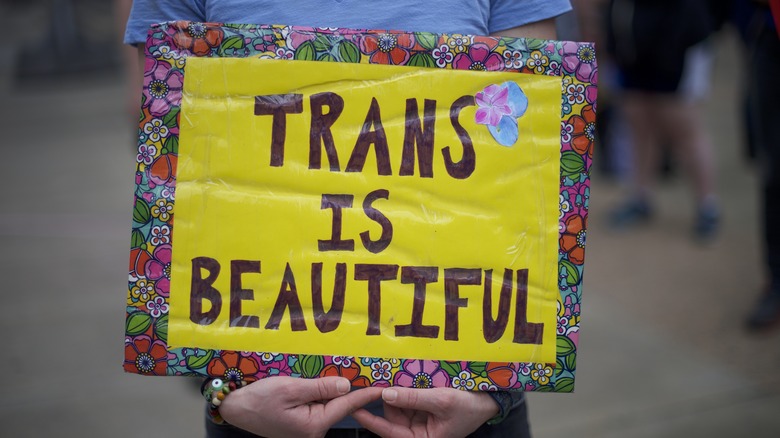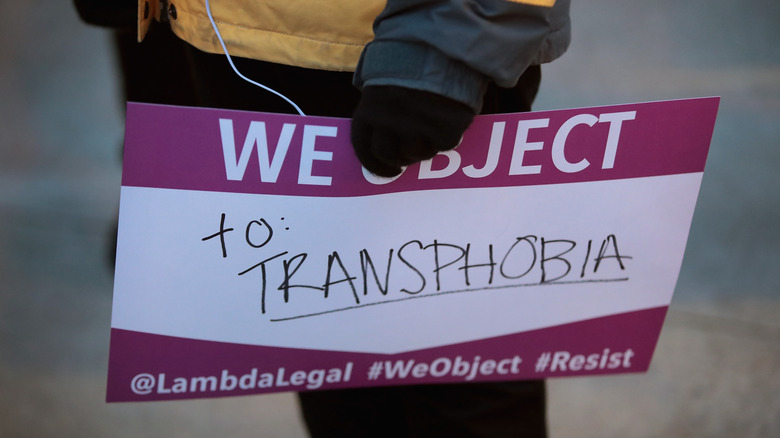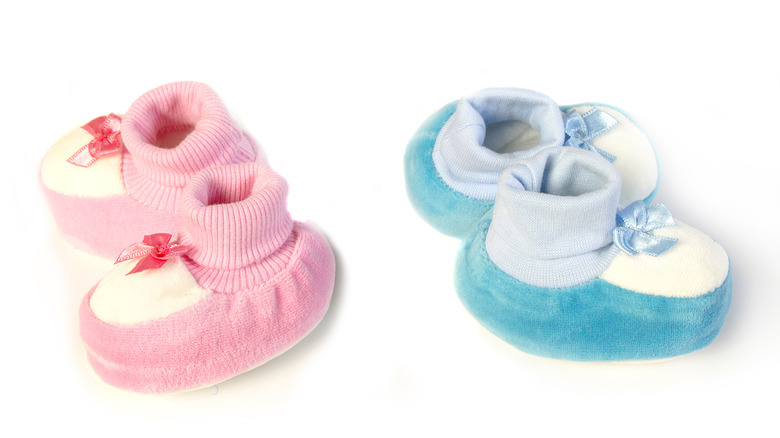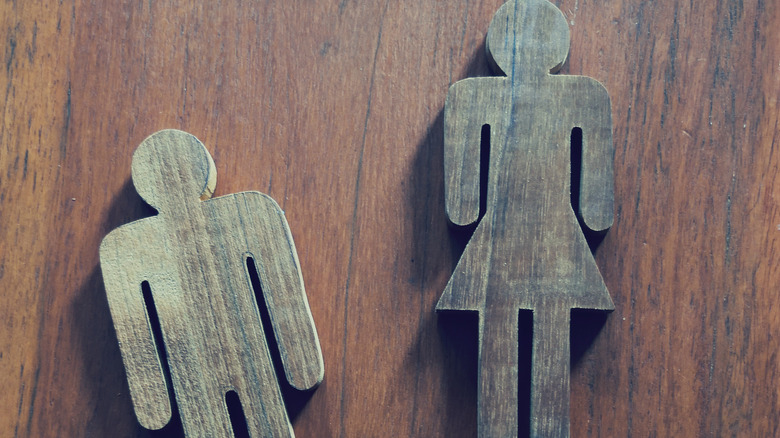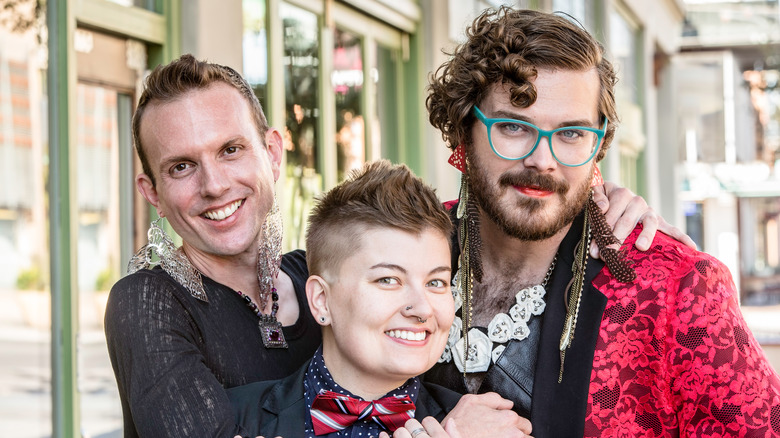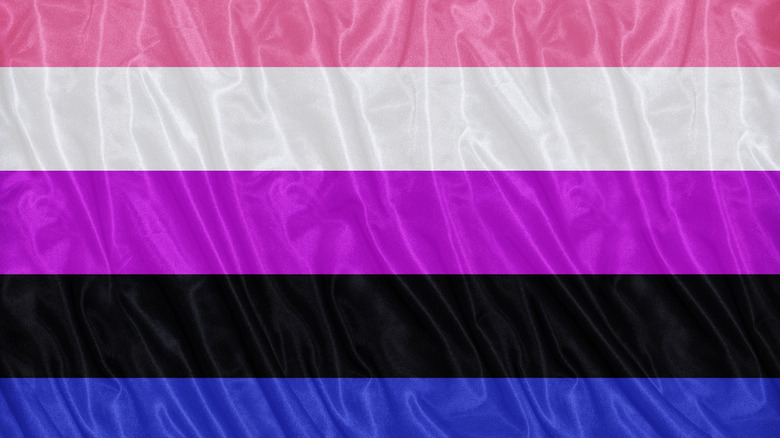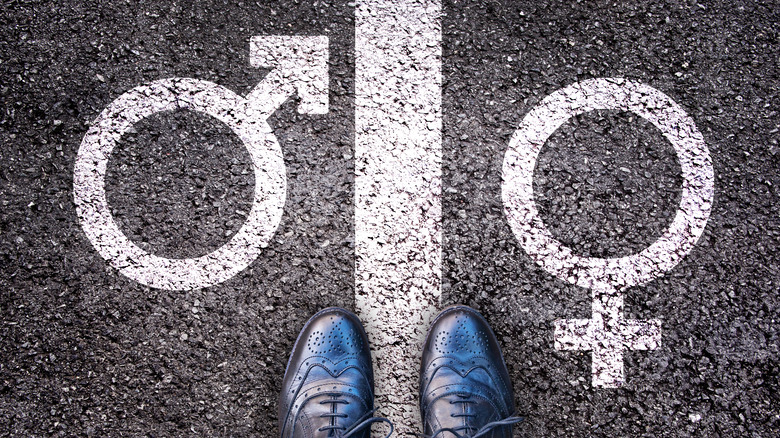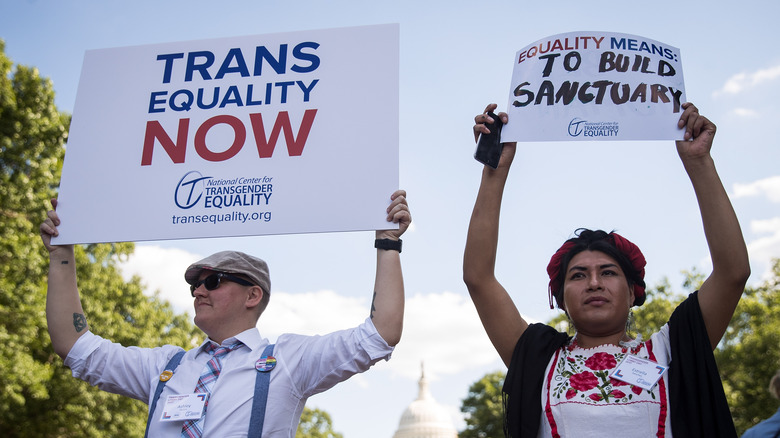The Right Language For Discussing Gender
We may receive a commission on purchases made from links.
The way we understand gender has changed a lot in the last few decades as more and more transgender people have paved the way for their rightful existence and acceptance. And along with these changes has come a new way to discuss gender, as new language was needed to update the old, prejudiced parlance that was acceptable for years.
For some people, this can feel intimidating, as it seems that terms and words fall in and out of favor very quickly, making it easy to make mistakes. But there are a few important terms to know that are relatively stalwart. Additionally, any effort you make to be as inclusive as possible is super important, as you show that you're making the effort. Bearing that in mind, here is some of the language you should know about when discussing gender.
Transgender
Among the most important terms to know when addressing the topic of gender is transgender. GLAAD defines transgender as an "umbrella term for people whose gender identity and/or gender expression differs from what is typically associated with the sex they were assigned at birth." Additionally, many transgender people, once they have come out, will take steps to more closely align their bodies with the gender they identify with. These steps may include taking prescribed hormones like estrogen and spironolactone for transgender women, and testosterone for transgender men. Transgender people may also undergo surgeries to achieve the same ends, but it's important to note that fixating on surgery as part of the trans experience is reductive, as it's only one facet of it.
The word transgender is an adjective, so don't use it as a noun — someone is transgender, not a transgender. And according Christina Anne-Marie DiEdoardo, a San Francisco based attorney, author, and activist, avoid adding ed to the end of the word. She said, "I am a Transgender woman, rather than a 'Transgendered woman' for the same reason I'm an 'Italian-American,' not an 'Italianed American.' My Trans status is a descriptor of my status as a woman, not a memorial of something that was done to me."
Finally, the word transvestite — a term that used to be used to describe men and women who cross-dress — has, according to DiEdoardo, fallen out of favor, so don't use it. And never, ever use the word "tr***y" — it's a slur.
Cisgender
Do you identify with the gender that you were assigned at birth? Do you feel comfortable presenting as either a man or as a woman? If you answered yes to both, that means you're cisgender. According to GLAAD, the definition of cisgender is a "term used by some to describe people who are not transgender."
In other words, you're cisgender, or cis, if you're comfortable in the gender you were assigned at birth. You also likely haven't ever had your gender identity called into question by other people. "The prefixes for both Transgender and cisgender are borrowed from chemistry," according to DiEdoardo. "Trans means 'crossing over' while cis means 'on the same side as,'" which explains where the terms come from.
The word cisgender, then, is helpful because it serves as a marker equal to transgender, just as straight is equal to gay. As author and activist Julia Serano told Time magazine, "There was a time when there were homosexual people and everyone else was considered to be the 'normal' people. Now people think of themselves as straight or heterosexual." And while some folks have objected to being labeled as cisgender, the majority of people happily accept the label — like me!
AMAB/AFAB
One reason terminology can evolve and change so much is because we understand things better than we used to, and AMAB and AFAB are perfect examples of this. AMAB is an abbreviation for "assigned male at birth," and AFAB is an abbreviation for "assigned female at birth." This kind of language is preferred over "born a boy" or "born a girl," as transgender people are always their true self and gender, even if they're not able to express it. Plus, being assigned something is vastly different than being born something, the former a designation given by other people and the latter an inherent condition.
DiEdoardo told me that when she speaks publicly about being trans, she points out that, "I — like all of us — wasn't 'born male or female.' Instead, I was born a baby. My gender was assigned to me by a doctor without any input from me within my first seconds of life."
The practice of assigning gender at birth based on genitals is problematic, then, as genitals are not a good way to identify a person's gender. Rather, gender is realized by people long after birth, and ideally should be selected by an individual person for themselves, rather than having it thrust upon them by others.
Intersex
Another reason assigning gender at birth is problematic is because many people are born intersex. According to the Intersex Society of North America, "'Intersex' is a general term used for a variety of conditions in which a person is born with a reproductive or sexual anatomy that doesn't seem to fit the typical definitions of female or male. For example, a person might be born appearing to be female on the outside, but having mostly male-typical anatomy on the inside."
They might also have genitals that appear to be in-between typical female and male genitals, or other variations such as chromosomal or hormonal variations. And while it's impossible to know exactly how common intersex conditions are, some experts estimate that one in 1,500 babies are born with genitals that don't conform to typical male or female anatomy.
The subject of anyone's genitals or secondary sex characteristics is a personal and intimate topic, so there's no reason to use the term intersex unless it concerns you. "It should only be used when persons describe themselves as intersex, as the term carries with it a considerable amount of medical pathology baggage," according to DiEdoardo. And very importantly, don't use outdated language. DiEdoardo continued, "Terms like 'hermaphrodite' or 'he-she' are hate speech and should be avoided in the same manner as ethnic slurs."
Gender binary
According to Emma Naliboff Pettit, the Program Director for Sustained Dialogue Campus Network, the gender binary "is the false idea that there are only two genders, men and women, when instead we know that there are infinite ways for people to identify and express their gender."
Basically, this mentality asserts that you can only be male or female, and that all men have penises and all women have vulvas, which is not the case as we now know. Pettit continued, "The more affirming way to talk about this is to talk about the gender spectrum. It is important to remember that some transgender people want to identify on the gender binary, while others want to identify with other places on the spectrum, or what is often called 'outside of the binary.'" More on that below.
It's important to emphasize, too, that while the gender binary is problematic, binary gender itself is not. DiEdoardo notes that, "Some people, both cis and Trans, have a binary — either male or female — gender. For those folks, their actual gender, which may or may not coincide with the one they were assigned at birth, is fixed."
Non-binary/Enby
Another problem with the gender binary is that it excludes people who identify as non-binary, or Enby for short. Essentially, folks who identify as non-binary are not exclusively male or female. DiEdoardo told me that, "Non-binary, or Enby, individuals may have both genders, may fluidly move back and forth between male and female, or have no gender at all."
So it's important to make sure you don't make any assumptions that erase their gender identity, as well as make sure you're attentive to your language. DiEdoardo added that, "Many, but not all Enby persons use 'they' as a singular pronoun — for example, if we were talking about [an] Enby person named Jane and someone asked, 'When will Jane arrive?' we might respond 'They will be here in an hour.'"
Note that using 'they' in its singular form is perfectly acceptable, grammatically speaking, so worrying about whether or not it should be used is not necessary.
Genderfluid
Some folks find that they don't identify with just one gender. According to DiEdoardo, that's means they identify as genderfluid. "In contrast to binary cis and Trans persons, those who are gender fluid may move between male and female or between male and female and an Enby identity."
And because of that, genderfluid people may differ regarding their pronouns. She continued, "They may use gender pronouns or pronouns which are agender, such as the singular 'they,' depending on the individual."
Being genderfluid is a completely valid gender identity, although a lot of genderfluid folks have had the unfortunate experience of not being taken seriously. As Lee Luxion, who identifies as genderfluid, told CNN, "Gender fluidity is much more than saying, 'oh, I want to play up the femininity traits that I have' or that 'I want to play up the masculine traits that I have.' It's an actual physical, mental and, for me, emotional shift in how I interact with the world."
Gender dysphoria
How does someone know if they are transgender? A primary indicator is knowing that the gender you were assigned at birth is different from the gender you actually are. According to GLAAD, the clinical term for this is gender dysphoria.
Pettit told me, "This is the more medical or psychological term in the DSM for the disconnect between your sex assigned at birth and your gender identity. This is the medical condition that a transgender person is diagnosed with that gets them access to a medical transition, which can include surgery and/or hormone therapy."
But that doesn't make being transgender a psychological problem! Pettit continued, "Gender dysphoria's presence in the DSM is controversial, because it makes it seem like being transgender is a mental illness, which is not at all true." So, it's best to avoid using this term unless you are a medical professional if you're cisgender.
Gender expression
Everyone expresses their gender outwardly in some way, be it with gendered clothing (like wearing a skirt or a men's suit), makeup, or beauty regimens. "All people, including cisgender people, have a gender expression, and it often shifts slightly from day-to-day," notes Pettit. "Gender expression is how a person outwardly performs or displays their gender markers, often through things like clothes, haircut, name, etc."
But your gender expression can vary depending on your circumstance. Pettit continued, "Gender expression doesn't necessarily match up with gender identity, which is how a person feels inside. Someone may identify as a woman, but for safety reasons may have to wear men's clothing and a men's haircut; just because someone is expressing a masculine or feminine gender outwardly does not mean that's what their identity is."
It's important to note that it's a lot easier for cisgender people to buck normative trends when it comes to gender expression. According to DiEdoardo, "Because society prioritizes the experiences and freedom of cis people over Trans people, cis persons have far more leeway to push back against these expectations than Trans people do before facing negative consequences." For example, consider cis women who choose not to shave their legs. This would be celebrated in feminist communities as a powerful act. DiEdoardo told me, "In contrast, if a Trans woman did the same thing, her 'commitment' to her womanhood would immediately be questioned even by so-called 'allies.'" So there can be an unfortunate double standard.
Gender confirmation surgery
Some transgender people elect to have surgeries that help align them with their true gender. This may include a bilateral mastectomy for transgender men, breast augmentation and facial feminization surgery for transgender women, and bottom surgery for both trans women and men. This procedure used to be called getting a "sex change operation," but that term is antiquated and inaccurate; now the proper term is gender confirmation surgery, or gender affirmation surgery.
"We no longer refer to the surgical process some Trans people go through to bring their bodies into conformity with their actual gender as 'sex change operations,' because it spreads the mistaken idea that surgery is required for all Trans people and — as a corollary — the equally wrong idea only those who have had 'the surgery' are 'really Trans,'" notes DiEdoardo. Surgery, then, isn't for everyone.
There are a variety of reasons transgender people may elect not to have surgery. DiEdoardo continued, "Some Trans people can't undergo gender confirmation or affirmation surgery for medical reasons; some lack the funds or access to doctors to do so, and some do not wish to surgically alter their bodies for different reasons. All are Trans whether they go under the knife or not." So given how multi-faceted and nuanced the trans experience is, it's best not to focus on surgeries when discussing transgender topics.
Respect is paramount
No one is perfect, and everyone will slip up every once in a while when discussing gender. There's a lot to learn, and language is evolving every day — sometimes faster than you can keep up with! But as long as you come from a place of respect, making the effort to be the best supporter that you can, you'll come to understand how to best approach these topics. And if you are even in doubt about anything, just ask. Most importantly, listen — you'll learn more by doing that than anything else.

